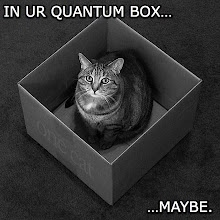Unless you've been living on another planet for the past month or so (and I wouldn't blame you if you had!), you have probably heard about the film adaptation of Dan Brown's
Angels and Demons. If you like your films, you've probably also heard from most critics that it is rubbish. Well, in my opinion, you heard wrong. Very wrong indeed.
(Minor spoiler warning, although most of the things I'll discuss you probably already know)
Although the script does deviate from the book at the beginning quite substantially (i.e. Langdon never goes to CERN in the film, and Max Kohler is absent), for those who haven't read the book, the film's sequence of events does set things out more logically. The middle and end follow the book fairly closely, and the ending sequence with the antimatter 'bomb' was just as spectacular as I thought (hoped?) it would be.
I feel that a lot of critics have become too used to seeing either a) films with no intellectual content at all, and are thus surprised to see something that at least tries to educate it's viewers; or b) films with so much emotion and high-class cinematography that they've forgotten what a good mystery film is.
Now,
Angels was never going to be 100% scientifically accurate, I mean if you took all the antimatter ever made in any particle accelerator, it would barely add up to a billionth of a gram, let alone the amount seen in the film (or mentioned in the book, which I have indeed read). Secondly, we don't know exactly what antimatter looks like, but I highly doubt that it looks like blue plasma! However, the ability of an antimatter weapon to level a city is most certainly true, although not in the way most people think. The reason that it is so powerful, and so efficient is that
100% of the mass of the particles involved is converted into energy. The energy density (amount of energy per kilogram) of antimatter is about 4 orders of magnitude (10,000x) greater than that of conventional nuclear fuel.
Taking the amount of antimatter in the container shown in the film to be about 10 grams, on total annihilation with the same amount of matter it would release about $1.8\times10^{15}$ joules of energy; this is about 430 kilotons of TNT. For comparison, the 'Little Boy' bomb dropped on Hiroshima in 1945 was about 15 kilotons, and that virtually obliterated the city centre. However, this calculation assumes that
all the mass is converted to gamma rays, which then superheat the surrounding matter extremely fast, leading to the devastating blast. The most likely candidate particle(s) for an antimatter bomb would not lead to this.
When antiprotons and antineutrons annihilate with regular protons and neutrons, around 60% of the energy produced is taken away by neutrinos, which do not interact with matter in any appreciable way, and therefore the energy is 'lost' (at least in terms of explosive yield). Taking this into account we get: $(1.8\times10^{15}J)\times0.4 = 7.28\times10^{14}J$. This is about 172kt of TNT, still a big explosion, but not the earth-shattering blast most people would expect.
In conclusion,
Angels and Demons is a fantastic film, especially if (like me) you're a fan of historical or semi-historical mysteries. The scientific inaccuracies don't really bother me all that much, it was never designed to be a particle physics film. Although I do think they should have given a bit more explanation as to exactly what antimatter does, and why it is so explosive.
